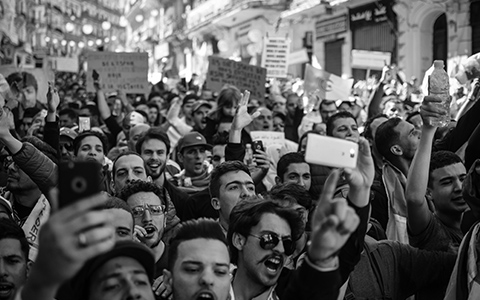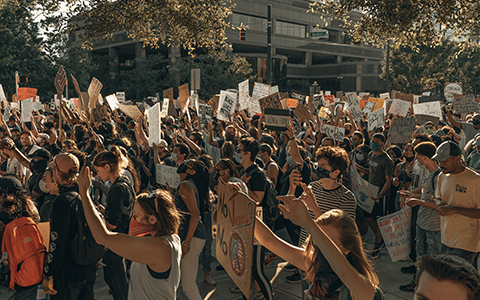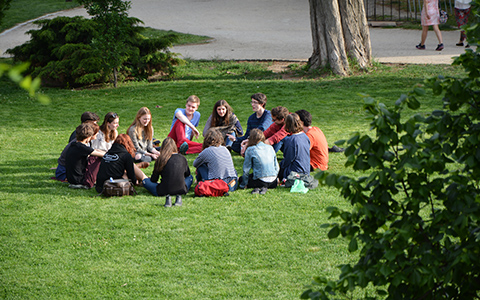
发布时间:2023-07-25
过去几周,欧盟各国公民迅速走上街头发表意见。大多数情况下他们是和平示威(罢工的工人、雇员、列车员、机场工作人员、公务员),而且通常是为了提高工资和改善工作条件。
然而,近日也有暴力示威发生,例如法国最近就发生了示威,以抗议警察的暴行,以及其他有争议的、有时甚至是容易激起民愤的国家政策。在德国,当“逐步淘汰煤炭”或为扩建河港而开垦林地等争议性问题受到威胁时,情况也是如此。
分析表明,法国是最容易发生罢工的国家,仅在私营企业,每千名职员一年因罢工就平均损失123天,超过了丹麦一天。加拿大(79天)、比利时(71天)和西班牙(62天)位列前五。英国仅次于德国,损失天数分别是20天和23天。

为何瑞士不发生或极少发生示威?
从2006年到2020年,平均每1000名瑞士职员每年只损失两个工作日。
在瑞士,罢工和民众抗议很少发生,因为瑞士有通过对话和谈判避免劳资冲突的悠久传统。瑞士教育的一个重要部分就是学习如何通过相互交谈而不是更对立的方式来解决问题。这一传统根植于瑞士社会,从瑞士“直接民主”的做法中也可见一斑:年满18周岁的人(瑞士人或持有瑞士“C类居留证”的人)每年会就各类法律提案进行4-6次投票(全民公决)。每一票都很重要,如果被否决,法律将被重写或放弃。这显然避免了在街头挑衅示威的必要。

这并不是说瑞士从未发生过劳资冲突。例如,2014年11月,日内瓦有轨电车和公交车司机就曾因预算和工作岗位削减而罢工,从而导致该市公共交通瘫痪。而日内瓦上一次公共交通罢工是在1982年。不过,瑞士的罢工少见而短暂,而且总是在尊重法律的情况下和平进行。
与瑞士不同的是,在许多欧盟国家,外国移民往往居住在大城市郊区自己的生活圈里。在那里,他们基本没有融入当地社会。他们不学习当地语言,上学仍然很困难,失业率一直高于平均水平,而且没有改善的前景。这让外来移民处于沮丧和孤立之中。特别是在法国,这一问题已经存在了几十年,尤其是在巴黎和马赛等大城市。

瑞士生活着许多不同国籍的人,他们大多完美地融入了当地的工作生活,很多人在金融界或工业界担任领导职务。瑞士以其多元文化地区、知名的教育体系、迷人的城市和世界闻名的阿尔卑斯自然公园,吸引着来自世界各地的家庭。瑞士拥有四种官方语言、优质多元的国际学校以及有吸引力的工作条件,这些都简化了融入社会的过程,从而给人们带来极大的社会满意度、安全感以及和平安宁。
因此,当邻国发生社会动荡时,瑞士极少有年轻人趁机上街游行。最近在法国边境附近的洛桑市就发生过一次这样的游行。不过这些都是零星事件,只有很少的人被临时拘捕,因为瑞士警方一向谨慎行事。在法国最近的骚乱中有2,000多名暴动分子被拘捕,而洛桑的一次小规模示威中只拘捕了七人,后者更多是作为预防措施。

对瑞士和瑞士人而言,保持瑞士传统的社会和平非常重要。瑞士与所有的邻国有着密切的经济合作,但“瑞士和平”的基础从未受到影响。
“瑞士直接民主”是指瑞士公民通过定期投票,自由决定实施哪些法律法规。这一制度经过了几个世纪的验证,是瑞士的经济安全和它闻名于世的品质生活的支柱。
Original English Text
Why Swiss people don't protest!
The past few weeks have shown that citizens in various EU states are quick to take to the streets to express their opinions. Mostly peacefully (striking workers, employees, train conductors, airport staff, civil servants) and mostly to demand higher wages and other improved working conditions. However, recently there were also violent demonstrations, such as the recent ones in France, against police brutality and other questionable and sometimes provocative state measures. The same was true in Germany, when the controversial issue of the "coal phase-out" or the clearing of forest areas for the expansion of a river port was at stake. France was the most strike-prone country analysed, with an average of 123 days lost per 1,000 workers in the private sector alone, beating Denmark by one day. Canada (79), Belgium (71) and Spain (62) rounded out the bottom five. Britain was just behind Germany, with 23 and 20 days lost respectively.
Why don't such strikes and demonstrations happen - or only very rarely - in Switzerland?
Between 2006 and 2020, an average of only two work days were lost per 1,000 Swiss workers per year.
Strikes and public protests are rare in Switzerland due to a long tradition of avoiding industrial conflict through talking and negotiation. It is an important part of Swiss education to learn how to solve problems by talking to each other rather than more antagonistic means. This tradition is anchored in the Swiss society and can also be seen in the practice of Swiss “direct democracy”: People (Swiss or with “C-permit”) over 18 years old vote between 4 – 6 times per year (referendum) on all kind of law suggestions. Each vote counts and in the case of rejection, the law is rewritten or abandoned. This clearly avoids the need to demonstrate provocatively in the streets.
That is not to say Switzerland never had labour conflicts. A strike by Geneva tram and bus drivers in November 2014, for example, paralysed public transport in the city over some planned budget and job cuts. But the previous public transport strike in Geneva was in 1982. However, strikes are rare, short and always peaceful respecting the law.
Unlike in Switzerland, many foreign immigrants in many EU countries live in their own neighborhoods on the outskirts of the big cities. There, little or no integration takes place. The national language is not learned, schooling remains difficult and the unemployment rate is constantly above average - with no prospect of improvement. This leads to frustration and isolation. In France in particular, this challenge has been known for decades, especially in the big cities of Paris and Marseille.
Many different nationalities live in Switzerland. They are mostly perfectly integrated into working life, often in leading positions in the world of finance or industry. Switzerland with its multicultural regions, renowned education system, attractive cities, world-famous alpine nature parcs is a magnet for families from all over the world. With its three official languages the country simplifies integration with international schools and attractive working conditions, leading to great social satisfaction, security and thus peaceful tranquility.
So when there is social unrest in a neighboring country, as recently in France, it can be rare for some young people to take this as their reason and march through the streets. This happened once recently near the French border in Lausanne. But these are isolated incidents with a few temporary arrests, as the Swiss police act as prudently as they do consistently. While more than 2,000 violent people were arrested in France during the recent riots, seven arrests were made at a small demonstration in Lausanne, more as a precautionary measure.
It is important to Switzerland and the Swiss that the traditional social peace in Switzerland is maintained. Economic cooperation with all neighbouring countries is close, but the basis of "Swiss peace" is never affected.
“Direct Swiss democracy" means that the Swiss citizens freely decides which rules and laws are implemented through regular voting. This system has proven itself for centuries and is the backbone of Switzerland's economic security and world-famous standard of living.
本文转载自瑞士雷梭勒家族办公室,如有侵权,敬请告知删除。
Sooswiss为您提供
瑞士方向私人管家式的定制服务:
1)家族传承 2)财富管理 3)投资咨询
4)企业服务 5)居留计划 6)国际教育
更多资讯请登录网站 www.sooswiss.com
